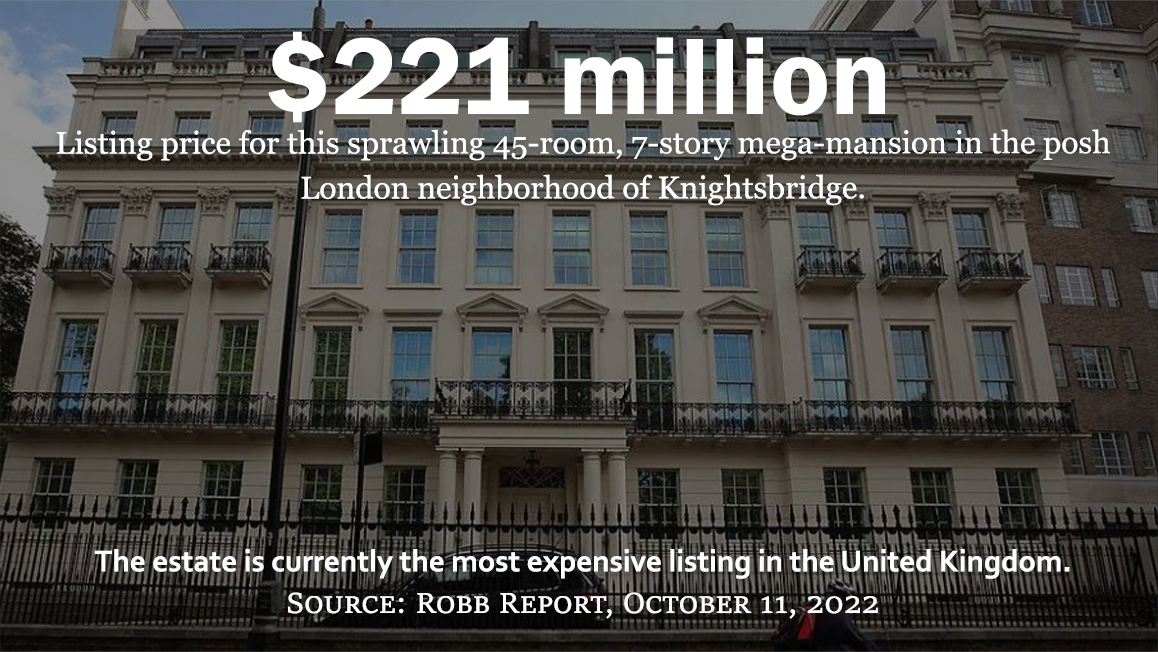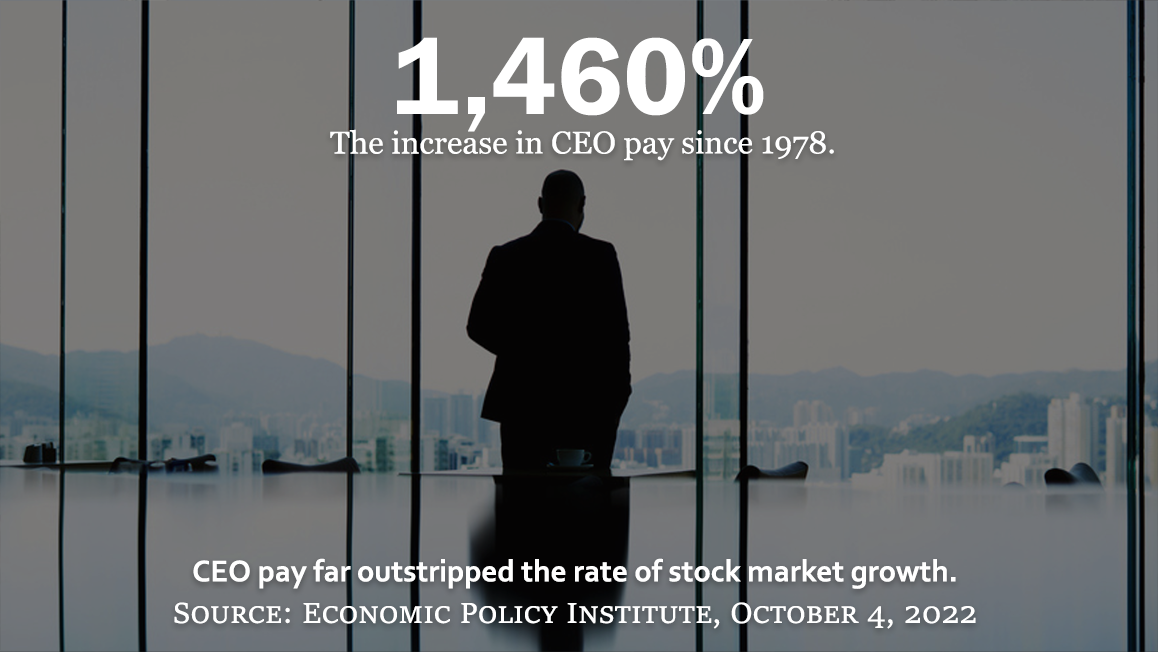| THIS WEEK |
All of us on the Inequality.org team are still buzzing about the opportunity we had last week to meet Chris Smalls, the president of Amazon Labor Union, at the 46th annual Institute for Policy Studies Letelier-Moffitt Human Rights Awards.
The fledgling Amazon Labor Union is currently facing the herculean task of taking on one of the largest corporations in the world — and the source of one of the world’s most massive private fortunes.
Amazon is, predictably enough, throwing the entire anti-labor book at the union Chris Smalls leads. The company last year spent over $4.3 million on anti-union consultants alone. Those consultants pocketed $3,200 daily for their efforts at the same time workers in Amazon warehouses were averaging just $16 an hour.
Despite the Amazon anti-union blitz, the ALU has successfully organized a warehouse of 8,300 workers on Staten Island, and now over 2,000 warehouse workers in Albany will be voting this week to create what could become Amazon’s second unionized U.S. warehouse .
“No matter what struggle you’re in, what industry you’re in, what movement you’re in, this is all our struggle and our fight together,” Smalls noted last week at the Letelier-Moffitt awards ceremony.
We all have a stake in the collective struggles now going on at Amazon and countless other workplaces throughout the world. We have more on those struggles in this week’s issue.
Chuck Collins and Rebekah Entralgo,
for the Institute for Policy Studies Inequality.org team
|
|
| |
|
| INEQUALITY BY THE NUMBERS |
 |
|
|
|
| |
|
| FACES ON THE FRONTLINES |
 |
| Food Bank Leader Wants Charity Reform |
In 2022 alone, the Oregon Food Bank will serve an estimated 1.5 million people, a historically high sign of food insecurity. Yet many donors and philanthropic entities feel no rush moving money to fund urgent unmet needs. Some $1.2 trillion tax-exempted dollars earmarked for charity, our Charity Reform Initiative estimates, sit stockpiled in foundations and assorted other intermediaries.
In a recent Senate Finance Committee hearing, Oregon Food Bank CEO Susannah Morgan issued a clarion call for charities to step up their giving: “When I hear of wealthy folks tucking money away, in hopes that they will make the future better, my response is: Make the future better right now for my neighbors who are struggling to put food on the table.”
You can hear more from Morgan, law professor Ray Madoff, Nonprofit AF founder Vu Le, and our own Chuck Collins in a webinar entitled Where Has All the Money Gone? this Wednesday, October 19. Also sponsoring the webinar, besides the panelists’ organizations: CalNonprofits, the Crisis Charitable Commitment, and Willamette Valley Development Officers. Click the link below to join in.
|
e
|
| |
|
| WORDS OF WISDOM |
 |
|
|
|
| |
|
PETULANT PLUTOCRAT
OF THE WEEK |
 |
| Nickeling and Diming the Unwary to Grand Fortune |
| Ronald Clarke, the CEO of the Atlanta-based digital payments powerhouse FleetCor, ended 2016 as Georgia’s top-paid corporate exec. How to explain his rise to glory? His wife Leeanne had a ready answer for the Atlanta Journal-Constitution: “People want to reward brilliance.” But people also don’t like to be “knowingly deceived” — and Clarke’s fortune, a U.S. district court has just ruled, rests on sheer deception. Clarke’s “under-the-radar” scam promised small business owners “discount” gas credit cards that ended up, after assorted FleetCor “surcharges” and “fees,” not providing any discounts at all. The scam cost FleetCor customers, the Federal Trade Commission calculates, “hundreds of millions of dollars in unexpected fees.” Judge Amy Totenberg has now blocked FleetCor’s illegal practices, and the company is appealing. Clarke, meanwhile, is keeping mum and rather brazenly letting his millions do his talking. He’s just purchased — for $15.7 million — the waterfront mansion that sits right next door to his current palatial home north of West Palm Beach. |
|
| |
|
| BOLD SOLUTIONS |
 |
| A Luxury Transfer Tax That Can Benefit Bostonians
|
The housing crisis lives on in Boston: Affording a median-priced local home now demands an annual income of $181,000, and nearly half of all Boston renters are spending more than 30 percent of their income on housing-related expenses.
In 2019, to battle this continuing crisis, the Boston City Council approved a luxury real estate transfer tax, committing the revenue from this 2-percent levy on all properties selling for over $2 million to affordable housing construction. But old-school state rules require approval for the tax from Massachusetts state lawmakers, even though the transfer levy wouldn’t cost the state a dime.
Inequality.org’s Omar Ocampo and Chuck Collins estimate that the state’s failure to approve the new tax has cost Boston residents $20 million in transfer revenue from just six luxury buildings. Their new report, The High Cost of Beacon Hill Inaction, also details the potential of a more progressive transfer tax system to combat Boston’s ongoing housing crisis.
Boston mayor Michelle Wu says the new report “highlights the need for us to move with urgency.” You can read the full study here. |
|
| |
|
| GREED AT A GLANCE |
 |
|
|
|
| |
|
| TOO MUCH |
 |
| What Harms Florida More, Hurricanes or the Rich? |
| Florida’s total damage from Hurricane Ian may well hit $70 billion. The good news? Without the federal program that discourages development in Florida’s flood-prone inland area south of Tampa, the hurricane’s toll would have run far higher. Florida’s coasts, by far the state’s most vulnerable real estate, have no comparable federal protection. On these coasts, state government calls the shots. Actually, we need to get a bit more precise here. Florida’s state government doesn’t call the shots. Florida’s rich do, and the immensity of their after-tax incomes has turned out to matter far more to state policy than the well-being of Floridian families of modest means. Inequality.org’s Sam Pizzigati has more. |
|
|
|
| |
|
| MUST READS |
What's on Inequality.org
Omar Ocampo and Chuck Collins, The High Cost of Beacon Hill Inaction. IPS report documents missing millions as Massachusetts state legislature fails to act on Boston’s luxury transfer tax.
Elsewhere on the Web
Carl Davis, Emma Sifre, and Spandan Marasini, The Geographic Distribution of Extreme Wealth in the U.S., Institute on Taxation and Economic Policy. The federal government and states have no shortage of options for taxing extreme wealth.
Max Lawson, The Rich Are the Ones Burning the Planet, Jacobin. Why we can’t save the world without taking on the rich.
Stewart Lansley, The equality question: Why Labour should re-embrace its egalitarian roots, Fabien Society. One of the UK’s top critics of concentrated wealth makes a powerful case that the fight against inequality needs to become a core Labour Party mission.
Sadie Bell, How ‘Triangle of Sadness’ Built (and Destroyed) a Luxury Yacht for the Ultra-Rich, Thrillist. Woody Harrelson plays the Marxist captain of a luxury yacht in Swedish filmmaker Ruben Östlund’s new Cannes Palme d'Or-winning flick that explores how the super rich wield power.
Robert Reich, Why is trickle-down economics still with us? The Guardian. Trickle-down satisfies politically powerful moneyed interests who want to rake in even more.
Greg Jaffe, Howard Schultz’s fight to stop a Starbucks barista uprising, Washington Post. A billionaire works feverishly to deny his workers a voice in their workplace.
Hermione Taylor, Tax cuts for top earners won’t deliver bang for your buck, Investors Chronicle. The evidence suggests that tax cuts for high earners won’t do much to either boost productivity or consumer spending.
Matt Durot, Meet the Billionaires Funding the Battle for Control of the House of Representatives, Forbes. Two rival super PACs have raised nearly $100 million for the 2022 congressional elections, with the billionaire donors to the GOP PAC nearly quadrupling the Democratic PAC total.
David DeWitt, Ohio among worst states for enabling billionaires and making inequality worse, think tank reports, Ohio Capital Journal. Ohio has established itself as an “emerging enabler” of billionaires and wealth inequality, says a new Institute for Policy Studies report.
Jared Brock, Are Billionaires Like Jeff Bezos Mentally Ill? Surviving Tomorrow. The desire for unlimited wealth accumulation rests on a profound moral sickness that a cap on individual wealth could help address.
|
|
| |
|
| A FINAL FIGURE |
 |
|
|
|
| |
|
| BE THE 1% (NO, NOT THAT 1%) |
 |
Our goal for 2022: that 1% of our Inequality.org subscribers become monthly sustainers and help grow our newsletter and research efforts. Be the 1%, for as little as $3 a month! |
|
|
|
| |
|
|